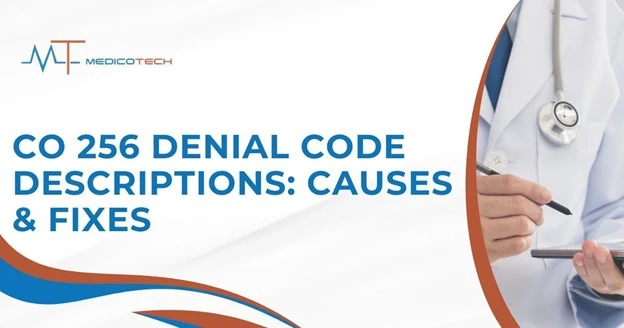CO 197 denial code is a common issue in medical billing that often causes confusion among healthcare providers. It signifies that a claim has been denied due to problems related to prior authorization, pre certification, or notification. If you’ve received a CO 197 denial, it means that the insurance company or payer has found issues with the necessary authorization or notification processes that should have been in place before the service was rendered.
Understanding why CO 197 denials occur is essential for ensuring timely reimbursements and reducing administrative challenges. For providers, it’s not just about fixing one denial but establishing proactive strategies that prevent such denials from happening in the future. In this article, we’ll explore the most common reasons for receiving a CO 197 denial and how you can resolve and avoid them moving forward.
What is CO 197 Denial Code?
CO 197 is a “contractual obligation” denial, which means that the provider is contractually responsible for covering the costs of the service that was denied. This denial code typically arises when there is an issue related to prior authorization or pre certification.
For instance, when a healthcare provider delivers a service without the necessary approval or when the pre certification process hasn’t been followed correctly, the insurance company may reject the claim using the CO 197 denial code. The denial is classified under the contractual obligation category because, as part of their contract, providers are responsible for obtaining proper authorization before delivering certain healthcare services.
It’s crucial for healthcare providers to understand that under a CO 197 denial, they cannot pass the cost onto the patient. The insurance company has the right to reject the claim if there is a problem with the pre authorization process. However, the provider still carries the financial responsibility for the service.
Common Reasons for CO 197 Denial
Understanding the most common reasons for CO 197 denials can help you address and prevent these issues from happening in the future. Let’s look at each of these reasons in detail:
Lack of Prior Authorization
One of the most frequent causes of CO 197 denials is the failure to obtain prior authorization from the insurance company before providing a service. Many health plans require pre authorization for specific services, meaning that the provider must get approval from the insurer before proceeding with the service. If this step is skipped, the insurer may deny the claim, and the provider will be responsible for covering the cost.
It’s essential to check with the insurance company beforehand to confirm whether authorization is required. Always secure the necessary approval before rendering services to avoid these denials.
Expired Authorization
Even when a provider does secure prior authorization, it can expire before the service is rendered. If the service is provided after the expiration date, the insurance company may issue a CO 197 denial because the authorization is no longer valid. This often happens in cases where there’s a delay in scheduling the procedure or if the approval process wasn’t completed on time.
To prevent this issue, always keep track of authorization expiration dates, and, if necessary, follow up with the insurance company to renew or extend the authorization before the service is provided.
Missing Authorization Number
Every claim that requires prior authorization should include the authorization number on the claim form. If the authorization number is missing, the claim may be denied with a CO 197 code. This is a simple but common mistake. Providers must ensure that the authorization number is accurately recorded and submitted with the claim to avoid denials.
A good practice is to double check the claim submission and confirm that all required information, including the authorization number, is included.
Incorrect Authorization Details
If the authorization information is incorrect, such as a mismatch between the service rendered and the service authorized, the insurance company may reject the claim with the CO 197 denial code. Incomplete or incorrect authorization details, such as an incorrect service code or patient information, can also lead to this issue.
Providers should be thorough when reviewing authorization details to ensure that they align with the services provided. Double checking the authorization against the service codes is crucial to avoid this problem.
Notification Failure
In some cases, an insurance plan may require prior notification of a service, even if prior authorization isn’t necessary. If the provider fails to notify the insurer about the service, the claim could be denied. This is often referred to as “notification failure.”
It’s important for providers to check the payer’s policy regarding prior notification and ensure that the required notification is submitted in advance. A failure to do so can lead to CO 197 denials, even if prior authorization isn’t required.
How to Fix CO 197 Denial
If you’ve received a CO 197 denial, don’t worry! There are several ways to address it and ensure that future claims are processed smoothly.
Verify and Locate the Authorization Number
The first step to resolving a CO 197 denial is to locate the missing authorization number. Carefully review the claim, and if the authorization number was omitted, track it down and include it in the corrected claim submission.
Correct and Resubmit the Claim
Once you have the correct authorization number, update the claim with the appropriate information and resubmit it to the payer. Be sure to double check all details to ensure that everything matches, and the claim has been corrected properly.
Request Retroactive Authorization
If you were unable to secure authorization before the service was provided, it might be possible to request retroactive authorization from the insurance payer. Contact the payer’s representative and ask if retroactive authorization can be obtained to cover the service.
Appeal the Denial
If retroactive authorization isn’t an option, you can appeal the CO 197 denial. To do this effectively, you’ll need to submit an appeal with strong supporting documentation, such as medical necessity letters, previous authorizations, or a statement explaining why the service should be covered. The more evidence you can provide, the better the chances of overturning the denial.
How to Prevent CO 197 Denials
Prevention is always better than cure, especially when it comes to billing and claims denials. By adopting proactive strategies, healthcare providers can significantly reduce the chances of CO 197 denials. Below are key steps you can take to prevent these denials from occurring:
Staff Education
Proper training of your Medical billing and clinical staff is essential to ensure that everyone is familiar with the payer requirements for pre authorization and notification processes. When staff members understand the specific requirements of different insurance payers, they are less likely to miss crucial steps in obtaining and submitting authorization.
Regularly holding training sessions and workshops will help staff stay updated on industry changes and payer policies, making it easier to navigate the complexities of medical billing.
Patient Eligibility Verification
Before providing any services, always verify the patient’s eligibility with the insurer to confirm that the required pre authorization is in place. This simple yet crucial step can save your practice from unnecessary denials later on.
By confirming a patient’s insurance coverage and pre authorization requirements upfront, you ensure that both the patient and the provider are on the same page, avoiding any surprises when the claim is processed. This step is especially important for services that are typically subject to prior authorization, such as elective procedures or high cost treatments.
Utilize Electronic Health Records (EHR)
Implementing an Electronic Health Record (EHR) system can be a game changer for managing authorizations and preventing denials. EHR systems can track and store authorization numbers, expiration dates, and other important details that will help you stay on top of prior authorizations for every patient.
By integrating authorization tracking into your EHR, you can set reminders for upcoming authorization expirations, making it easier to follow up with insurance companies before services are rendered. This proactive approach helps avoid the risk of expired or missing authorizations, which are some of the most common causes of CO 197 denials.
Conclusion
In conclusion, the CO 197 denial code can be frustrating for healthcare providers, but it is not an insurmountable obstacle. Understanding the reasons behind the denial, such as missing, expired, or incorrect prior authorization, is the first step toward resolving and preventing these issues in the future.
By verifying patient eligibility, ensuring proper authorization, and training staff to understand payer requirements, you can minimize the chances of receiving a CO 197 denial. In cases where a denial does occur, the key is to promptly correct the claim and resubmit it, or appeal with strong supporting documentation.
With careful attention to detail, proactive tracking, and education, you can streamline the process, prevent costly denials, and ensure timely reimbursement for your services. Properly handling CO 197 denials can ultimately help you maintain a healthy revenue cycle and focus on delivering quality care to your patients.
FAQs
Here are some frequently asked questions (FAQs) about CO 197 denials:
What is the CO 197 denial code?
Ans. CO 197 is a denial code used when a claim is rejected due to missing or incorrect prior authorization, pre certification, or notification. The provider is financially responsible for the cost of the service.
How can I avoid CO 197 denials?
Ans. To avoid CO 197 denials, ensure that all required prior authorizations are obtained before services are rendered, track expiration dates, verify patient eligibility, and submit claims with accurate and complete authorization information.
Can I appeal a CO 197 denial?
Ans. Yes, if your claim is denied with a CO 197 code, you can appeal the decision by submitting the correct authorization details, medical necessity documentation, or requesting retroactive authorization if applicable.
What if the authorization is expired?
Ans. If the authorization has expired, contact the insurance company to request an extension or retroactive authorization. You may also be able to appeal the denial by providing evidence of medical necessity.
How can I get retroactive authorization?
Ans. To obtain retroactive authorization, contact the payer’s customer service and explain the situation. If the insurance company agrees, they may grant retroactive approval for the service that was rendered.




